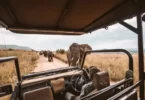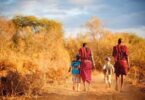Are There Medical Facilities Available in Case of Emergencies on a Safari in Tanzania?
When planning a safari in Tanzania, one of the most common concerns travelers have is: Are there medical facilities available in case of emergencies? This is a very important question, especially because safaris take place in remote areas. At Seko Tours, we prioritize the safety and well-being of our guests. This guide will help you understand what medical facilities are available during your safari in Tanzania and what to do in case of an emergency.
Medical Facilities in Tanzania’s Safari Destinations
Tanzania is a vast country with many beautiful national parks, such as Serengeti, Ngorongoro Crater, Tarangire, and Manyara. These parks are far from big cities, but that does not mean you will be without medical help. Medical services are available at different levels, from small clinics to fully equipped hospitals.
RELATED POST: Is a Safari Guide Necessary for the Migration Safari?
1. Hospitals in Major Cities
Before starting your safari, it is good to know that Tanzania has well-equipped hospitals in major cities like Arusha, Dar es Salaam, and Moshi. If a serious medical situation arises, patients can be transferred to these hospitals for better treatment.
Some of the best hospitals in these cities include:
- Kilimanjaro Christian Medical Centre (KCMC) in Moshi
- Mount Meru Regional Hospital in Arusha
- Aga Khan Hospital in Dar es Salaam
These hospitals have modern facilities, experienced doctors, and emergency departments ready to handle different medical cases.
2. Medical Clinics Near Safari Parks
If a traveler has a minor health issue, they do not need to travel all the way to a big city. There are small clinics near national parks that can handle common illnesses such as headaches, stomach problems, or minor injuries. For example:
- Seronera Health Clinic in Central Serengeti
- Wasso Hospital near the Northern Serengeti
- FAME Medical in Karatu (near Ngorongoro)
These clinics are not as big as hospitals, but they are very helpful in treating basic medical problems.
3. Emergency Evacuation Services
In serious situations, an emergency evacuation may be required. This means a special medical team will fly the patient to a major hospital. Tanzania has several air ambulance services available for tourists. Some of the reliable air evacuation services include:
- AMREF Flying Doctors
- Kilimanjaro Air Rescue
These services are fast and well-equipped with medical professionals who can handle critical situations in the air while transporting a patient.
What Happens in Case of an Emergency on Safari?
At Seko Tours, we take every precaution to ensure that our guests are safe. However, emergencies can still happen. Here’s what you need to know:
1. First Aid on Safari
All Seko Tours safari vehicles are equipped with a first-aid kit. Our guides are also trained in basic first aid, so they can help with minor injuries, bites, or other medical concerns while waiting for further assistance.
2. Contacting Medical Help
If a guest has a medical emergency, we contact the nearest medical facility or evacuation service immediately. Our team communicates using radio calls and mobile networks to ensure a quick response.
3. Evacuation if Necessary
If the condition is serious, an emergency evacuation is arranged. A medical flight will take the patient to a fully equipped hospital in Arusha, Dar es Salaam, or Nairobi if necessary.
How to Prepare for Health and Safety on a Safari?
Before coming on a safari with Seko Tours, there are a few things you can do to stay safe and healthy:
1. Get Travel Insurance
We always recommend travel insurance that covers medical expenses, emergency evacuation, and trip cancellations. This will give you peace of mind in case of any unexpected medical needs.
2. Vaccinations and Preventive Measures
It’s important to get vaccinations before your trip. Some recommended vaccines include:
- Yellow fever (required in some cases)
- Typhoid
- Hepatitis A and B
- Rabies (for those planning long stays or visiting rural areas)
Taking malaria prevention medication is also highly advised because Tanzania is a malaria-prone country. Using mosquito repellent and wearing long-sleeved clothes in the evenings will help prevent mosquito bites.
3. Carry Personal Medication
If you take regular medication, carry enough supplies for the whole trip. It is also good to bring basic medicine for headaches, stomach upsets, allergies, and pain relief.
RERELATED POST: How Do I Avoid Crowds During the Migration Safari?
Final Thoughts
A safari in Tanzania is an unforgettable experience, and your health and safety should not be a concern. Seko Tours ensures that all our guests are well taken care of, and we have a plan for any medical emergency that may arise. Whether it’s a small health issue or a serious condition, there are medical facilities and evacuation services available to help.
If you’re planning a trip to Tanzania and have any questions about medical safety, feel free to reach out to us. Seko Tours is here to help you create a custom Tanzania safari while making sure you have a safe and enjoyable adventure.







